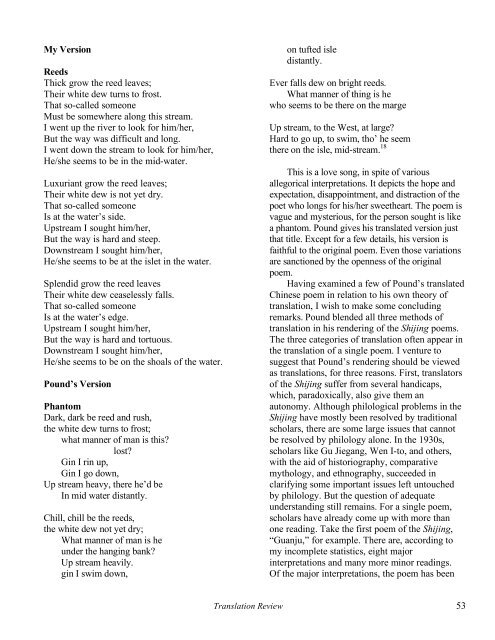table of contents - The University of Texas at Dallas
table of contents - The University of Texas at Dallas
table of contents - The University of Texas at Dallas
You also want an ePaper? Increase the reach of your titles
YUMPU automatically turns print PDFs into web optimized ePapers that Google loves.
My Version<br />
Reeds<br />
Thick grow the reed leaves;<br />
<strong>The</strong>ir white dew turns to frost.<br />
Th<strong>at</strong> so-called someone<br />
Must be somewhere along this stream.<br />
I went up the river to look for him/her,<br />
But the way was difficult and long.<br />
I went down the stream to look for him/her,<br />
He/she seems to be in the mid-w<strong>at</strong>er.<br />
Luxuriant grow the reed leaves;<br />
<strong>The</strong>ir white dew is not yet dry.<br />
Th<strong>at</strong> so-called someone<br />
Is <strong>at</strong> the w<strong>at</strong>er’s side.<br />
Upstream I sought him/her,<br />
But the way is hard and steep.<br />
Downstream I sought him/her,<br />
He/she seems to be <strong>at</strong> the islet in the w<strong>at</strong>er.<br />
Splendid grow the reed leaves<br />
<strong>The</strong>ir white dew ceaselessly falls.<br />
Th<strong>at</strong> so-called someone<br />
Is <strong>at</strong> the w<strong>at</strong>er’s edge.<br />
Upstream I sought him/her,<br />
But the way is hard and tortuous.<br />
Downstream I sought him/her,<br />
He/she seems to be on the shoals <strong>of</strong> the w<strong>at</strong>er.<br />
Pound’s Version<br />
Phantom<br />
Dark, dark be reed and rush,<br />
the white dew turns to frost;<br />
wh<strong>at</strong> manner <strong>of</strong> man is this?<br />
lost?<br />
Gin I rin up,<br />
Gin I go down,<br />
Up stream heavy, there he’d be<br />
In mid w<strong>at</strong>er distantly.<br />
Chill, chill be the reeds,<br />
the white dew not yet dry;<br />
Wh<strong>at</strong> manner <strong>of</strong> man is he<br />
under the hanging bank?<br />
Up stream heavily.<br />
gin I swim down,<br />
on tufted isle<br />
distantly.<br />
Ever falls dew on bright reeds.<br />
Wh<strong>at</strong> manner <strong>of</strong> thing is he<br />
who seems to be there on the marge<br />
Up stream, to the West, <strong>at</strong> large?<br />
Hard to go up, to swim, tho’ he seem<br />
there on the isle, mid-stream. 18<br />
This is a love song, in spite <strong>of</strong> various<br />
allegorical interpret<strong>at</strong>ions. It depicts the hope and<br />
expect<strong>at</strong>ion, disappointment, and distraction <strong>of</strong> the<br />
poet who longs for his/her sweetheart. <strong>The</strong> poem is<br />
vague and mysterious, for the person sought is like<br />
a phantom. Pound gives his transl<strong>at</strong>ed version just<br />
th<strong>at</strong> title. Except for a few details, his version is<br />
faithful to the original poem. Even those vari<strong>at</strong>ions<br />
are sanctioned by the openness <strong>of</strong> the original<br />
poem.<br />
Having examined a few <strong>of</strong> Pound’s transl<strong>at</strong>ed<br />
Chinese poem in rel<strong>at</strong>ion to his own theory <strong>of</strong><br />
transl<strong>at</strong>ion, I wish to make some concluding<br />
remarks. Pound blended all three methods <strong>of</strong><br />
transl<strong>at</strong>ion in his rendering <strong>of</strong> the Shijing poems.<br />
<strong>The</strong> three c<strong>at</strong>egories <strong>of</strong> transl<strong>at</strong>ion <strong>of</strong>ten appear in<br />
the transl<strong>at</strong>ion <strong>of</strong> a single poem. I venture to<br />
suggest th<strong>at</strong> Pound’s rendering should be viewed<br />
as transl<strong>at</strong>ions, for three reasons. First, transl<strong>at</strong>ors<br />
<strong>of</strong> the Shijing suffer from several handicaps,<br />
which, paradoxically, also give them an<br />
autonomy. Although philological problems in the<br />
Shijing have mostly been resolved by traditional<br />
scholars, there are some large issues th<strong>at</strong> cannot<br />
be resolved by philology alone. In the 1930s,<br />
scholars like Gu Jiegang, Wen I-to, and others,<br />
with the aid <strong>of</strong> historiography, compar<strong>at</strong>ive<br />
mythology, and ethnography, succeeded in<br />
clarifying some important issues left untouched<br />
by philology. But the question <strong>of</strong> adequ<strong>at</strong>e<br />
understanding still remains. For a single poem,<br />
scholars have already come up with more than<br />
one reading. Take the first poem <strong>of</strong> the Shijing,<br />
“Guanju,” for example. <strong>The</strong>re are, according to<br />
my incomplete st<strong>at</strong>istics, eight major<br />
interpret<strong>at</strong>ions and many more minor readings.<br />
Of the major interpret<strong>at</strong>ions, the poem has been<br />
Transl<strong>at</strong>ion Review 53

















